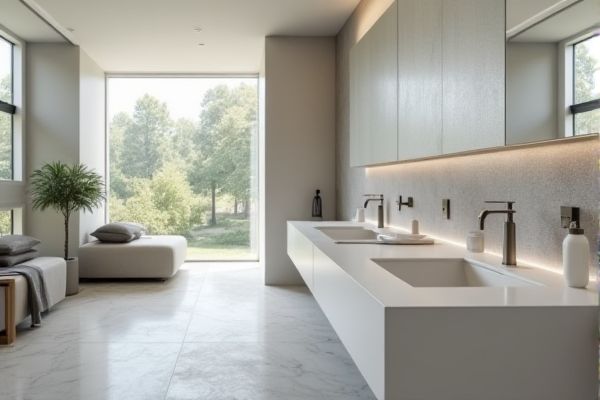
In-wall faucets save counter space and offer a sleek, minimalist look by being embedded within the wall, while deck-mounted faucets provide easier installation and accessibility by attaching directly to the sink or countertop. Discover which faucet type best suits your bathroom style and practical needs by reading the rest of the article.
Table of Comparison
| Feature | In-Wall Faucet | Deck-Mounted Faucet |
|---|---|---|
| Installation Location | Mounted inside the wall | Mounted on sink or countertop deck |
| Space Saving | Maximizes counter space | Occupies sink or countertop area |
| Maintenance | More complex, requires wall access | Easier, accessed directly on deck |
| Design Aesthetics | Minimalistic, sleek appearance | Traditional, visible hardware |
| Installation Cost | Typically higher due to wall work | Generally lower, simpler setup |
| Suitability | Ideal for modern, streamlined bathrooms | Fits diverse styles, easy to replace |
| Water Damage Risk | Higher risk if leaks occur behind wall | Lower risk, easier leak detection |
Introduction to In-Wall and Deck-Mounted Faucets
In-wall faucets are installed flush within the wall, offering a sleek and minimalist look that saves counter space and simplifies cleaning. Deck-mounted faucets attach directly to the sink or countertop, providing easier access to plumbing connections and often more straightforward installation. Each type serves differing aesthetic and functional needs depending on bathroom or kitchen design preferences.
Design Aesthetics: Modern vs. Traditional
In-wall faucets offer sleek, minimalist design aesthetics that complement modern bathrooms by creating a clean, uncluttered look with exposed spouts and controls mounted directly on the wall. Deck-mounted faucets provide a more traditional appearance with visible fixtures installed on the sink or countertop, adding classic charm and accessibility. Your choice between these styles impacts the overall design, with in-wall faucets enhancing contemporary spaces and deck-mounted options fitting seamlessly into classic or transitional settings.
Space Efficiency and Countertop Clutter
In-wall faucets maximize space efficiency by freeing up countertop area, creating a sleek and minimalist bathroom or kitchen design. Deck-mounted faucets occupy valuable countertop space, often leading to more clutter and less room for other essentials. Choosing in-wall faucets reduces countertop obstruction and allows for easier cleaning and maintenance.
Installation Requirements and Complexity
In-wall faucets require precise plumbing within walls, often necessitating professional installation and potential wall modifications, increasing complexity and cost. Deck-mounted faucets offer simpler installation directly onto sinks or countertops, requiring fewer structural changes and making them more DIY-friendly. Choosing between them depends on existing plumbing infrastructure and desired aesthetic integration.
Plumbing Access and Maintenance
In-wall faucets offer a sleek design by concealing plumbing within the wall, but they can complicate access for repairs due to the need to open wall panels. Deck-mounted faucets are easier to maintain because all plumbing connections are exposed on the sink or countertop, allowing straightforward access for inspection and fixes. Choosing between the two depends on balancing aesthetic preferences with the convenience of ongoing maintenance and plumbing access.
Cost Comparison and Budget Considerations
In-wall faucets generally involve higher installation costs due to plumbing modifications and wall repairs, making them less budget-friendly upfront compared to deck-mounted faucets, which are easier and cheaper to install. Deck-mounted faucets offer more flexibility for replacements and upgrades without extensive remodeling, helping you manage long-term budget considerations effectively. Choosing the right option depends on balancing initial expenses with potential maintenance and design preferences for your space.
Cleaning and Daily Upkeep
In-wall faucets offer streamlined surfaces that reduce dirt buildup, making cleaning faster and more efficient compared to deck-mounted faucets which often have crevices around their base where grime accumulates. Deck-mounted faucets require frequent wiping around the mounting area to prevent water stains and mold, increasing maintenance time. Choosing an in-wall faucet can simplify daily upkeep by minimizing hard-to-reach spots and enhancing overall hygiene.
Durability and Longevity
In-wall faucets generally offer superior durability and longevity due to their protected installation within the wall, shielding components from external damage and wear. Deck-mounted faucets, however, are more exposed to daily use and environmental factors, which can lead to quicker deterioration over time. You can extend the lifespan of either type with regular maintenance, but in-wall models typically require less frequent repair or replacement.
Popular Brands and Models Reviewed
Grohe and Delta offer popular in-wall faucets like the Grohe Concetto and Delta Trinsic, known for sleek design and easy installation in modern bathrooms. Kohler's Verdera and Moen's Align represent top deck-mounted faucets, favored for durability and versatile configurations in kitchens and baths. Reviews highlight Grohe for its water-saving technology and Moen for intuitive handle operation, helping consumers choose based on style and functionality.
Choosing the Right Faucet for Your Bathroom or Kitchen
In-wall faucets offer a sleek, modern aesthetic and save counter space, making them ideal for minimalist bathroom or kitchen designs. Deck-mounted faucets provide easier installation and maintenance, with a wide variety of styles and functionality suited for traditional or high-traffic areas. Selecting the right faucet depends on factors such as available space, plumbing configuration, and desired design impact.
 homyna.com
homyna.com